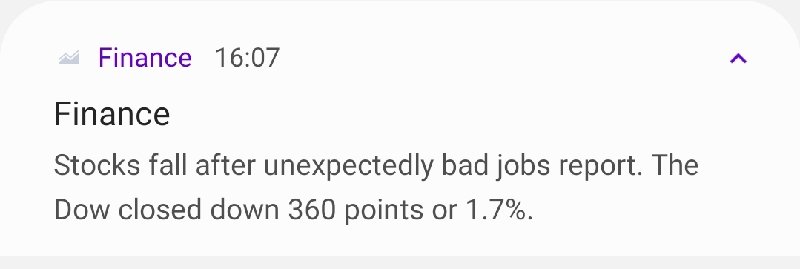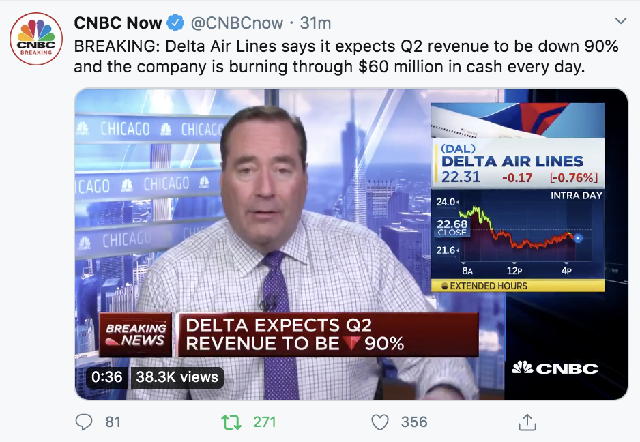Go  | New  | Find  | Notify  | Tools  | Reply  |  |
| Member |
That was a great interview. Mr. Hourican is a man with a plan, and a history of treating his customers right. I put in a limit order, but it hasn't gone off yet. Down 12% so far today, but I think SYY will thrive post Corona. ---------------------------------------------------- Dances with Crabgrass | |||
|
| Member |
Focus on quality, good cash flow, and excellent credit. The companies that can weather this storm will need all three. I am watching VZ, GD, JNJ, MMM, HD right now. | |||
|
Tinker Sailor Soldier Pie |
"Unexpectedly"?   ~Alan Acta Non Verba NRA Life Member (Patron) God, Family, Guns, Country Men will fight and die to protect women... because women protect everything else. ~Andrew Klavan | |||
|
| Now in Florida |
| |||
|
| Member |
Warren Buffett sold 13 Million shares of Delta yesterday and the day before. Berkshire Hathaway still owns 59 million. https://www.barrons.com/articl...st-stock-51585949991 Rhinoso- I tend to buy in stages also.....maybe 10%/20% at a time. As long as your close to the bottom and perhaps average your cost down if it keeps falling and hits a deeper bottom, you'll do well in the long run. As soon as someone announces a cure or that the virus is clearly residing, it will be too late as the market will jump back 15-20% that day.....in the long run, you'll make money, we all will. I'm just making tiny trades at the moment...….but I did the same mistake.....bought 100 shares of TWIN (disc) the other day at $7.96...….well guess what, it dropped to $5.11 today...…(lucky me also) so I ended up buying another 100 shares at $5.26, at least my cost average is now $6.61 instead of $7.96...…. What I tend to do also in a volatile market, is if a stock goes up an amount I pre-determine (over my purchase price).....10%, 20%, I'll sell half.....if it drops again lower than my previous purchase price, I'll buy the half I sold back.....if it keeps going I let it ride. I don't think we've seen the bottom yet of the DJIA, however I think it will be a bumpy ride further down and we'll have some peaks and valleys but a downward trend. I also bought 1000 shares of F @ $4.29 and 2000 shares of MFA @ 1.04......today...... | |||
|
| In the yahd, not too fah from the cah  |
So I tried to invest my deferred comp through work via a TD Ameritrade account however since it is a state fund they have restrictions for mutual funds only. There goes my plan of investing in Royal Carribean, Norwegian, Carnival and Boeing. However I noticed the Fidelity Select Leisure Fund FDLSX. Which is comprised of similar stocks. Does anyone have any advise on investing in this? I don't know a whole lot about mutual funds. | |||
|
| Ignored facts still exist |
Honestly it depends on what else is in your portfolio. Each individual situation differs, which is why getting such advice is difficult over the internet. Unless you have a well diversified portfolio, then I'd say no on this leisure sector fund. Diversification is really your friend in investing. That generally means a well diversified low-cost no-load mutual fund for most. Vanguard is low cost, and therefore what I suggest, but gotta do what's within your employer's plan choices. . | |||
|
Member |
Just open a separate account with TD. Myself I had a muni riding along for many years with my company and have been waiting for another opportunity to snap up blue chips at rock bottom prices. Never thought it would happen again like in 09 but here we are. There's diversity for the long run and then there's predatory for times like these. | |||
|
| Member |
You probably already know that mutual funds own a basket of assets, in which you own a percentage. Different mutual funds invest in different types of assets, stocks, bonds, money market and so forth. The problem with mutual funds, is that they don't trade during the day. They add up the closing value of all of their holdings at the end of the day, and that's the price you pay to buy it, or sell it. So when you but in a buy order, you don't know what price you will pay. So you can go to CNBC (dot) com and put in the symbol FDLSX. It will show you information about the fund. The top holdings are McDonald's and Starbucks, which represent over 33% of the fund, so you are not getting a lot of exposure to the cruise line holdings you really want. The fund has a dividend yield of .75% (sux), and an expense ratio of .76% which is really high. It is a shame you are limited to mutual funds. Exchange Traded Funds (ETF) are usually better. The SPY is an ETF that has the S&P 500 in it. It has a dividend yield of 1.95% and an expense ratio of .09%. So the Fidelity mutual fund has an expense ratio that is 8 times the SPY ratio. Over twenty years that really adds up. Try to find the mutual fund with the lowest fee and a portfolio of the stocks you like. ---------------------------------------------------- Dances with Crabgrass | |||
|
| Member |
No shit??? Why not go cash until this shit storm passes? It doesn't cost much to do that. Do you own a low-cost no-load mutual fund that hasn't handed you your own head on a platter? Why not stand on the sidelines for a while? | |||
|
| Partial dichotomy |
The market is on a tear today. I get the feeling that people...investors and fund managers don't want this bull market to end. And seeing the infection numbers drop gives people confidence to buy. I think the virus numbers are going to get better as we progress and the market will continue to make it's way up with some down days in between. Of course, businesses and the economy in general have a long way to come back, but as has been noted, our current economy is still better than times with obama. | |||
|
| Ice age heat wave, cant complain.  |
Anyone picking up the cruise lines currently? It's a long term play and I can't imagine they get any bail out money, but they're all low right now. NRA Life Member Steak: Rare. Coffee: Black. Bourbon: Neat. | |||
|
| Member |
yes -- but its a small fraction of my investments and I am well-diversified otherwise i agree they are a poor prospect for bailout money given their international registrations am down some curretly on RCL but up on NCLH. i am planning to hold on and ride it out over the next 2-3 years. we shall see. cruises - while they may not appeal to some people - have become VERY popular ways to 'explore' multiple localities without having to do all the complex travel arrangements i don't see the industry sinking although it will take some time obviously to resume previous volume levels ymmv ------------------------------- Proverbs 27:17 - As iron sharpens iron, so one man sharpens another. | |||
|
| Member |
I'm in the Marine industry, yacht industry. The airlines are a safer bet than the cruise ship industry. Cruise ship industry is going to be a long term play. I think some people are going to change their minds about taking a cruise ever again, perhaps a low percentage 10-20%. The other issue is the ships need crew and maintenance, whether passangers are on them or not, so they're bleeding money like crazy right now. The other issue is the companies like RCL and others have ships already in build, that generally take 2 years to build/finish and are finishing at various times of this year, next year, and they're going to have to pay for those and I don't think the demand will be there yet to fill them. They're going to have to discount fares for a year or two just to keep ships full and cash flowing, ie lower profits. I think it's a 3 year time line before you really start seeing them very profitable. The market always generally moves a lot more on Mondays (and Fridays) as people have had time to analyze things and make decisions and put in orders over the weekend. | |||
|
Don't Panic |
Speculation is a thing, and if you are playing with fun money and/or you know investing like the back of your hand, go for it. Huzzah, a couple numbers are not climbing as fast as they had been. Well, that could be worse, and no mistake. On the other hand, this crud infects tigers now... Animal carriers, what fun. What else are we going to learn about this virus, and when are we going to learn it? To misquote Churchill, this is neither the beginning of the end, nor the end of the beginning. If anyone thinks what we have here is investing - continuous daily swings of +/2-3-4-5% - then why bother with Wall Street commissions and fees, just move to Vegas. Meanwhile, still waiting for bargains, and an environment where value might be possible to assess. | |||
|
| Member |
this is why have read other articles making this point over the years ------------------------------------------------------- What Happens When You Miss the Best Days in the Stock Market? Tempted to sit on the sidelines during a market correction? Here's what you'd give up. Michael Aloi https://www.fool.com/investing...-days-in-the-st.aspx The S&P 500 index enjoyed its biggest first-quarter gain this year since 1998, which made me wonder: How many people missed out on this rally? The growth came after the index was walloped in the fourth quarter, with the index down 13.55% for that period. Surely, the thought of cashing out passed through many investors' minds. Suppose you did get spooked last year, and you gave up by selling off your positions, trading your investments for cash. Eventually you'll get back in the market when the worst is over, you tell yourself. That sounds like a reasonable strategy. However, waiting it out also means potentially missing some very big up days in the market, which makes an enormous difference in your portfolio's performance over time. If you're thinking of getting out of the stock market after a drop, you may be giving up big gains on the rebound. Image source: Getty images. Time in the market, versus time out of the market J.P. Morgan Asset Management's 2019 Retirement Guide shows the impact that pulling out of the market has on a portfolio. Looking back over the 20-year period from Jan. 1, 1999, to Dec. 31, 2018, if you missed the top 10 best days in the stock market, your overall return was cut in half. That's a significant difference for only 10 days over two decades! Here's how a $10,000 initial investment fared over the past 20 years depending on if its investor stayed invested or instead, missed some of the market's best days. January 4, 1999 to December 31, 2018 Dollar value Annualized Performance Fully invested (S&P 500 index) $29,845 5.62% Missed 10 best days $14,895 2.01% Missed 20 best days $9,359 -.33% Missed 30 best days $6,213 -2.35% Missed 40 best days $4,241 -4.2% Missed 50 best days $2,985 -5.87% Missed 60 best days $2,144 -7.41% Source: JP Morgan. You don't have to miss many good days to feel the impact. The return went from positive to negative by missing the 20 best days of the market over 20 years. Putnam Investments found similar results by studying the data from 2003 to 2018. If you were fully invested in the S&P 500, your annualized total return was 7.7% during that time. But if you missed the 10 best days in the market, it dropped to a paltry 2.65%. Missing out compounds over time If you're guilty of missing some of those really big days in the market, you're not alone. Investment research firm Dalbar publishes an annual survey of the average investor's performance versus the benchmark. Dalbar studied retail equity and fixed-income mutual fund flows (money in and out of the fund) each month from Dec. 31, 1997 to Dec. 31, 2017 to calculate the "average investor" return. The average investor performed below average when compared to buying and holding the S&P 500 index. The below table demonstrates that in the 20 years from 1997 to the end of 2017, the average equity investor saw returns of 5.29%, versus the index which was up 7.2%, marking a difference of almost 2 percentage points (based on average annual total returns). The average fixed-income investor fared even worse. Over the same time period, the Barclays Aggregate Bond Index was up 4.98% but the average fixed-income investor was up only 0.44%. One of the main reasons average investors lagged the benchmark was due to mistiming the market or missing the up days. Here's how a $100,000 initial investment fared from Dec. 31, 1997 to Dec. 31, 2017, depending on how it was invested. Ending dollar value Average annual performance Average equity investor $280,377 5.29% S&P 500 index $401,346 7.2% Difference $120,969 1.91% Source: American Funds and Dalbar. The Dalbar study highlights how missing a few of the market's up days leads to lackluster performance over time. Of course, the reverse is true, too. If you are out of the market, you also miss the worst days too. But over time, as demonstrated by the two tables, if you're going to invest in the equity markets, you have to be in it to win it, which means riding through the bad days to get those good days. Many of the best days in the market come right after the worst days. According to the J.P. Morgan study, six of the 10 best days occurred within two weeks of the 10 worst days. One example was in 2015: The best day was Aug. 26, just two days after the worst day in the stock market that year. The lesson here is that investors are rewarded for sticking to their investment plan and riding out the bad days in the market over time. It may seem harmless to wait out the bad days with your money, but this also means missing the up days that should boost performance over time. One way to help your portfolio weather an impending storm in the stock market is through smart asset allocation -- having money in both stocks and bonds. Traditionally, bonds have done well when stocks slide. Asset allocation can lower the volatility in your portfolio. Fewer hiccups in your portfolio may help keep you from panicking and selling out in the tough times like last year. The bottom line is: Don't miss the market's good days! -------------------------------------------------------------------------------- Proverbs 27:17 - As iron sharpens iron, so one man sharpens another. | |||
|
| It's not you, it's me. |
Regarding mutual funds...is there a pro/con to putting money into them now? I was thinking of throwing some money into vangaurd. | |||
|
| Member |
You would be better off finding a low cost ETF. There will likely be lower fees, more widely traded, and thinner spreads. Keep in mind that as of noon on 4/6, we are officially in Bull Market territory. We are up 21% from the lows on 3/23, and market volatility is nearly an all time high. Just saying. A wide ETF such as a dividend fund would be the place I would squirrel money away if I was not willing to do a bunch of due diligence. A S&P 500 index would be my second choice. I am not providing investing advice, and any comments made above are market level. | |||
|
| Member |
good suggestion VTI is a good one from Vanguard ----------------------------------------- Proverbs 27:17 - As iron sharpens iron, so one man sharpens another. | |||
|
| Ignored facts still exist |
VTI is excellent!!!! Low cost, and the only real factor is making sure whatever broker you use charges a low commission/fee to buy it. . | |||
|
| Powered by Social Strata | Page 1 ... 20 21 22 23 24 25 26 ... 36 |
| Please Wait. Your request is being processed... |
|
© SIGforum 2025

